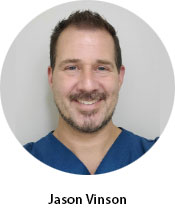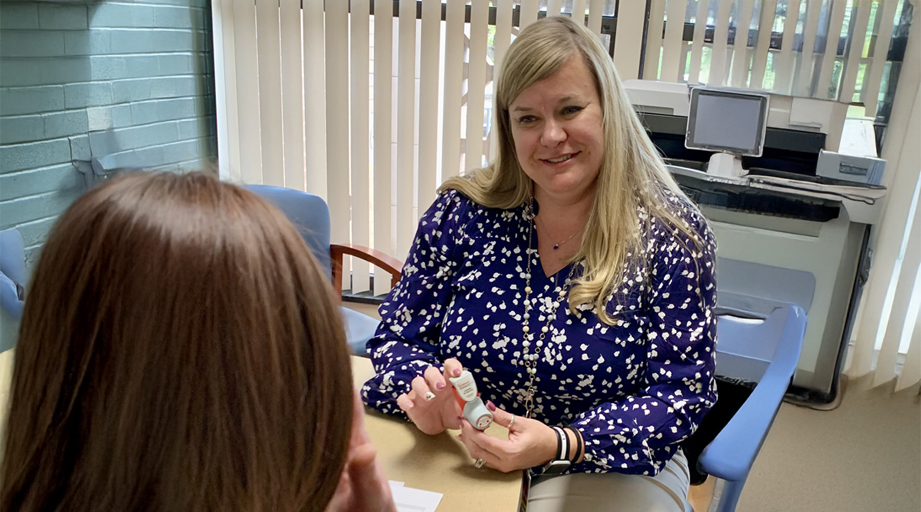
Tennessee pharmacist Jason Vinson is exploring the bounds of innovative pharmacy practice as he counsels patients, screens them for COVID-19, and offers drug therapy advice at the Germantown family dentistry office of Mike Pulido.
 Vinson has been under contract with the dental group since August 2019. The practice also serves as an experiential rotation site for third- and fourth-year student pharmacists from the University of Tennessee Health Science Center (UTHSC).
Vinson has been under contract with the dental group since August 2019. The practice also serves as an experiential rotation site for third- and fourth-year student pharmacists from the University of Tennessee Health Science Center (UTHSC).
After the COVID-19 pandemic emerged, the medication therapy management (MTM)-focused experiential program expanded in scope, with Vinson and his students screening clinic patients for SARS-CoV-2 infection and other medical issues.
“We are screening every single patient before they even get in the facility,” Vinson said. “We do temperature, COVID questions; we do blood pressure and pulse oximetry, and then we start a med history. We ... ask them questions about allergies and stuff like that to see if anything’s changed.”
By screening patients on entry instead of incorporating screening into the dental appointments, the practice is able to schedule more total patients each week, Vinson said.
Although some patients are delaying medical care during the pandemic, they do seek treatment for dental pain. That creates an opportunity for Vinson and his students to fill gaps in routine medical care as they screen patients.
“We have had several patients whose blood pressures were elevated over multiple readings, that ended up going to their physician for follow up and were placed on 1-2 antihypertensives,” Vinson noted.
While on rotation at the 35-year-old clinic, which sees 600–600 patients each month, the students interact with people who have common and unusual chronic conditions. Vinson said the practice’s patients take an ever-expanding list of medications that may affect their dental and overall health.
The dental practice addresses issues like dry mouth that patients might not discuss with a physician.
“Maybe you have older patients that are on lots of medications, and they do cause dry mouth. That patient might be getting up every two hours to take a sip of water,” Vinson explained. He said scrutinizing each patient’s drug regimen and recommending remedies such as saliva substitutes “can make a profound impact on peoples’ lives.”
One of Vinson’s most memorable patient interactions involved a woman who wanted information about three medications she was prescribed about 15 years ago after being diagnosed with rheumatoid arthritis.
The patient disclosed that she had stopped taking the drugs because of side effects, and she asked about alternative medications. But she was very active and showed no signs of disease progression despite discontinuing her medications. The patient’s history also included a three-year course antimicrobial therapy for Lyme disease, which can cause joint inflammation and arthritis.
Vinson recommended that the patient’s physician order blood tests for specific rheumatoid factors, which hadn’t been done at the time of diagnosis. He said the physician concluded, on the basis of new test results, that the patient didn’t have rheumatoid arthritis.
The dental office staff usually advises patients to speak with their physician about any recommendations made during the dental visit. But Vinson said he and his colleagues work directly with medical care providers when needed to discuss issues.
He also emphasized that Tennessee’s collaborative practice act doesn’t authorize him to change a dental patient’s medication regimen.
“But I can give them some options, or ask them to speak to their physician about maybe changing the timing of some things,” he said.
The clinical information that Vinson collects is recorded in the practice’s electronic record system. He said it’s not yet practical for dental offices to integrate their electronic records with systems used in physician offices, so the content is limited to what each patient can or will provide.
Because the dental record software lacks a field for medication information, Vinson’s comments on allergies, disease states, medications, and potential interactions between medications and dental issues are documented as clinical notes.
Since Jan. 1, the state has required prescriptions for Schedule II–V controlled substances to be transmitted electronically. Because of this mandate, Vinson said, “the software utilized by the office integrates with [patients’] preferred pharmacies, and a more accurate pharmacy profile can be obtained.”
Although Vinson isn’t able to bill for his services, the dental practice receives payment from UTHSC for hosting student pharmacists. Vinson has also secured funding and personal protective equipment for the clinic through small grants, mainly from the Tennessee Pharmacists Association and its state partners.
Before coming to the dental clinic, Vinson worked as a hospital pharmacist, director, and market director of pharmacy for 15 years. He has been a preceptor with UTHSC students since 2004. For the past year and a half, he has worked as needed as a clinical pharmacist at LeBonheur Children's hospital.
He got to know Pulido, his former dentist, as a patient and a medication expert.
“I had previously established a connection with Dr. Pulido about antibiotics and the opioid crisis and how both could affect dentistry,” Vinson said.
Vinson said that when he approached Pulido about collaborating, the dentist saw the potential benefits of having a pharmacist onsite to review and recommend medications and answer questions about drug therapy — despite the inability to generate revenue for those services.
He said dental practice business models are changing as insurers drive a trend toward large multisite practices. The profession is also more involved in preventive care.
Vinson said the dental team supports his work with the Tennessee Pharmacists Association to “push the collaborative practice act” and create new opportunities for him to provide care for patients in the community and to bill for those services.
He said future pharmacy services could include vaccinations, covered through insurance or out of pocket, and full medication therapy management consultations.
[This news story appears in the May 1, 2021, issue of AJHP.]







